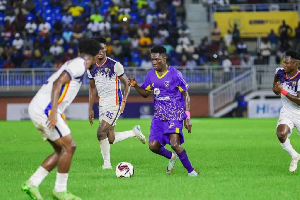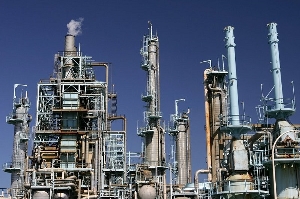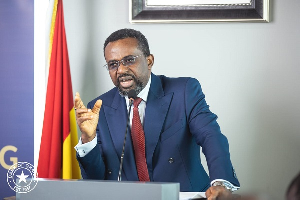A GNA Feature by Boakye-Dankwa Boadi
Accra, June 7, GNA - It is said that in times of conflicts even sworn enemies come together to fight the common enemy and it should, therefore, not be strange for an avowed environmentalist to call upon Ghana's Development Partners in Europe to bring pressure to bear on the Government of Ghana to do the right thing by asking it to revoke the licence it has granted Newmont Gold Ghana Limited (NGGL) to destroy the Ajenua-Bepo Forest Reserve in the Eastern Region.
This Writer is all the more compelled to ask for the assistance of Ghana's Development Partners because he has been invited to participate in the 2010 Global Media Forum to be held in Bonn, Germany from June 21 - 23 under the theme "The Heat is On, Climate Change and The Media". The Deutsche Welle Global Media Forum 2010 will address and assess the pivotal issues that have consigned the world to such a precarious state and seek a viable way out by looking at the role of the media on an international, national and local level. The 2010 conference will bring together media users and producers, scientists, peace-keeping and conflict prevention specialists, energy industry experts, policy makers as well as representatives from international, grassroots and non-governmental organizations to discuss how to harmonize individual and collective action in order to steer the world away from a foreboding future and instead toward genuine sustainability. The role the media play in this process will consistently be in focus during the three-day conference.
This Writer is of the view that the negative impact of allowing NGGL to destroy the Ajenua-Bepo Forest Reserve would far outweigh any temporary economic benefits that would accrue to the Republic of Ghana and, therefore, any patriotic Ghanaian, who really has the interest of Ghana at heart, should come out strongly against the destruction of the country's forest reserves.
It is a fact that the gold bearing reef is found all over Ghana. The only difference is that at some places it comes to the surface while at other places it is deep down underground. What this means is that if we decide to mine the gold wherever it is known to exist it would mean that we are going to destroy the whole country so that Managers of multinational companies like NGGL and AngoloGold Ashanti could make more money for their shareholders in America and Europe.
Mining in the Reserve would lead to the disappearance of the Ajenua Bepo, which is the highest mountain in the area, to be replaced with a trench, which would be 2.5 kilometres long; 900 metres wide and 500 metres deep.
Since the mountain facilitates relief rainfall in the area its disappearance would lead to the creation of a micro-climate, which would impact negatively on farming activities.
A study funded by NGGL came out clearly to state that five tributaries of the Pra River would be destroyed and stressed the need to protect the Ajenua-Bepo Forest Reserve, even though it had been ranked "depleted", because it formed part of an area of continuous forest that was left in South-Eastern Ghana - the rest of the forest cover in the South-Eastern Ghana is gone.
Communities downstream from the Project site would be deprived of water since water from the Pra River would be used up by the Project. Protest against the destruction has been ongoing but it appears Collins Dauda, Minister of Lands, Forestry and Mines, is adamant and is bent on ensuring the destruction of Ajenua-Bepo, notwithstanding the fact that posterity would forever, associate him with this monumental destruction of a major national asset and landmark. On February 11 2010, the Ghana News Agency reported: "A group of 14 organisations has asked the Government to revoke the mining lease and permit granted to Newmont Gold Ghana Limited (NGGL) to destroy the Ajenua-Bepo Forest Reserve in the Eastern Region. "Mining in the Reserve would lead to the creation of a trench, which would be 2.5 kilometres long; 900 metres wide and 500 metres deep. NGGL last week announced that the National Democratic Congress (NDC) Government had consummated the process began by the New Patriotic Party (NPP) Government to allow the destruction of the Ajenua-Bepo Forest Reserve, citing the provision of employment for the youth in the area and the fear that Galamssey Operators would invade the area, among the reasons. "Addressing a news conference in Accra, the Spokesperson of the organisations, Mr Kwabena Bomfeh accused the Government "of engaging in policy contradictions and violating national laws, visions and regulations". He said mining in forest reserves contravened certain provisions in the National Land Policy developed by the Ministry of Lands and Forestry in 1999, adding that Section 4.5(a) states that to ensure the conservation of environmental quality, no land with primary forest cover would be cleared for the purpose of establishing a forest or tree crop plantation or mining activity.
"The National Land Policy of 1999 states further in Section 4.4(b): "All lands declared as forest reserves , strict nature reserves , national parks, wildlife sanctuaries and similar land categories constitute Ghana's permanent forest reserves and wildlife estates , and are 'fully protected' for ecosystem maintenance , biodiversity conservation and sustainable timber production."
"Debunking the argument that the Ajenua-Bepo Forest Reserve could be restored after NGGL had destroyed it, Mr Bomfeh quoted a document titled "Mining in Forest Reserves- Concerns of the Forestry Commission" which stated: "Mining companies have often been required to rehabilitate even off-reserve areas they have mined. Although Off-reserve mining has gone on in Ghana for some time, we are yet to see a demonstration from industry any best practice rehabilitation suitable to tropical forests". The Forestry Commission document concluded: "The Commission is thus hesitant about destroying more areas with the hope of rehabilitating them. We believe we should get the rehabilitation methods right in off-reserve forests before venturing into Forest Reserves."
"Mr Bomfeh said NGGL had not yet paid compensation to the affected people but the Company had already asked the farmers in the Akyem area where the mining activities of the Newmont Akyem Project would take place not to upgrade their farms and buildings as part of the Company's legal rights, which had been imposed on the people through the granting of the mining lease and permit.
"He said the Police have been posted on sentry duties in some of the communities to ensure that the economic activities of the poor farmers came to an abrupt end in contravention of the National Land Policy that: "No interest in or right over any land belonging to an individual, family, clan, stool or skin can be compulsorily acquired without payment,, in reasonable time, of fair and adequate compensation.
"Section 13(9) of the Minerals and Mining Act, 2006(Act 703) also states that a mineral right holder has sufficient authority to enter the land in respect of which the right is granted subject to negotiating compensation with affected farmers (Section 73) and paying compensation based on compensation principle (Section 74).
"One of the objectives of the National Land Policy of 1999 is to "Protect the rights of landowners and their descendants from becoming landless or tenants on their own land," he said, adding that "mining in Ajenua Bepo Forest Reserve is going to make the landowners in the Akyem Kotoku area landless and tenants on their own lands". The 14 organisations included: Youth for Action Ghana (YAG); Dialogue for Advocacy; Ghana Catholic Bishops' Conference Secretariat; Centre for Labour Rights and Community Services (CLARCS) and Center for Public Interest Law, (CEPIL). "The others are; Voices of Tomorrow Leaders Foundation (VOTOLEAF); Concerned Citizens Association of Prestea; Concerned Farmers Association of Akyem; WACAM; Youth and Concerned Farmers Association of Teberebie; Youth and Concern Group of Teleku-Bokazo and Anwia and Third World Network. The rest are; Convention People's Party (CPP); GIA/NABIO Agro Forestry Development Organisation (GNADO) and Centre for Environmental Impact Analysis (CEIA).
The Environmental Protection Agency (EPA) of Ghana went ahead and granted permit to Newmont to mine in the Forest Reserve. Director of Mining at EPA, Mr Anthony Andoh said the Agency issued the permit after taking into consideration the concerns raised by the nongovernmental organizations and the Environmental Impact Assessment (EIA) presented by Newmont on its plans to mitigate the negative effects of its operations. The Akyem Project is an open pit mine that would be 2.5 kilometres long, 900 metres wide 500 metres deep. Newmont has an 85 per cent interest in the Akyem Project, which at year-end 2004 had 5.4 million equity ounces of reserves. The estimated cost of development is approximately 500 million dollars and is expected to generate steady-state annual consolidated gold sales of approximately 400,000 ounces. This Writer is of the view that the Government should revoke the licence it has granted NGGL to destroy the Ajenua-Bepo because the farming it enhances is more sustainable. It would also be Ghana's contribution to the fight against climate change. Climate change is a global phenomenon that puts at risk our common humanity and no effort should be spared in combating it. 7 June 10
Opinions of Monday, 7 June 2010
Columnist: GNA














